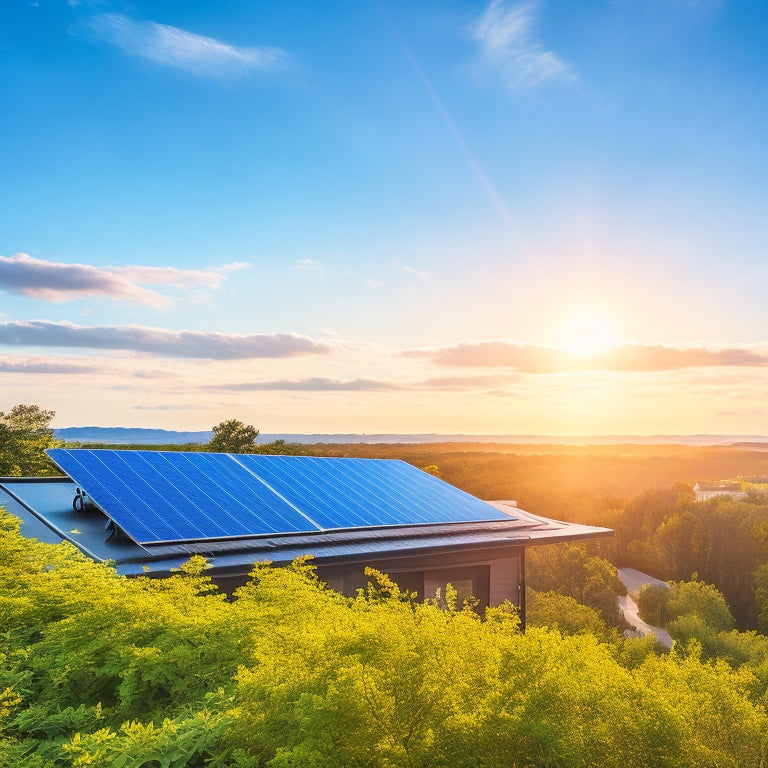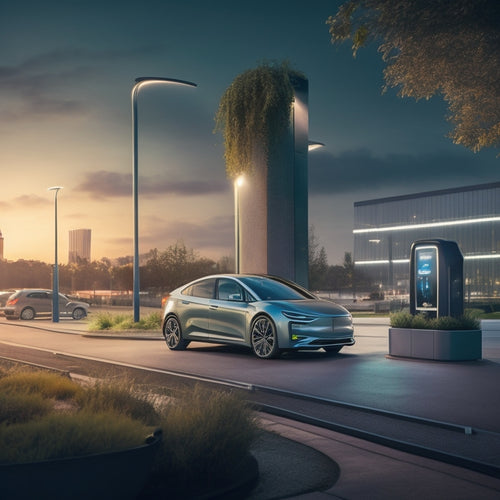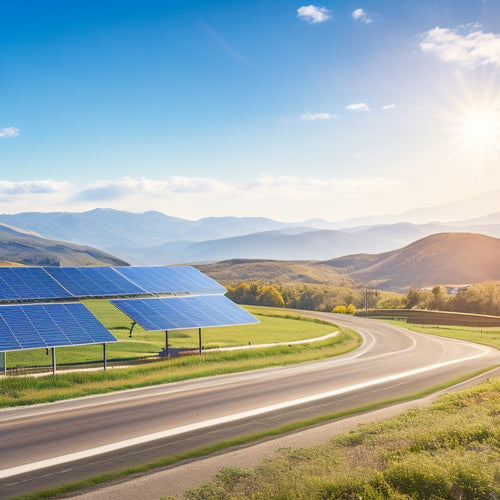
Achieving Energy Independence With Solar
Share
By shifting to solar energy, you can reduce your reliance on traditional power sources, saving up to 20% on energy costs and facilitating the achievement of energy independence. You'll also minimize your carbon footprint, increase your property value, and guarantee backup power during outages. Plus, you can take advantage of government incentives and rebates to offset the upfront costs. As you investigate the benefits of solar energy, you'll uncover a path to independence that not only saves you money but also contributes to a cleaner, more sustainable future - and there's more to reveal about how solar can enable your energy independence.
Overview
- Solar energy systems can generate electricity during power outages, providing a reliable source of power and enhancing energy independence.
- With solar panels, you can reduce your reliance on traditional energy sources, decreasing your utility bills and financial burden.
- Solar energy production leads to reduced air pollution and a substantial decrease in greenhouse gas emissions, contributing to a cleaner environment.
- Predictable energy expenses and minimal maintenance requirements of solar panels lead to further cost reductions over time.
- Government incentives and rebates, such as the Federal Solar Investment Tax Credit, significantly reduce upfront costs, making solar more accessible.
Energy Savings and Cost Reduction
As you consider shifting to solar energy, one of the most notable benefits to factor in is the potential for substantial energy savings and cost reduction. By utilizing the sun's power, you can greatly reduce your reliance on traditional energy sources, leading to lower utility bills.
In fact, solar energy can increase energy efficiency by up to 20%, resulting in considerable cost savings over time. With solar, you can enjoy predictable energy expenses, reducing your financial burden. Additionally, solar energy systems require minimal maintenance, further reducing costs.
Homes with solar panels can sell for up to $15,000 more than non-solar homes, enhancing property resale value and market appeal. By switching to solar, you can break free from the volatility of traditional energy markets and enjoy the freedom that comes with energy independence.
Reduced Carbon Footprint Benefits
Utilizing solar energy allows you to shrink your carbon footprint drastically, which is critical in today's environmentally conscious world.
By switching to solar, you'll considerably reduce your reliance on fossil fuels, resulting in a substantial decrease in greenhouse gas emissions. This, in turn, contributes to a cleaner environment and helps combat climate change.
As rural areas shift to renewable energy solutions enhancing rural electricity access, adopting sustainable practices like solar energy is essential for minimizing environmental impact.
With solar, you'll be producing clean energy, reducing air pollution, and preserving natural resources for future generations.
Increased Property Value Potential
Most homeowners who install solar panels can expect a significant increase in their property value, with some studies suggesting an average enhancement of up to $15,000.
As you join the growing solar market trends, your property's value will likely appreciate. This is because solar panels are viewed as a desirable amenity, making your property more attractive to potential buyers.
In fact, off-grid solar battery systems can increase property value by 3-5% energy independence benefits, appealing to eco-conscious buyers.
When you increase your property value, you may also face increased property tax implications. However, many states offer exemptions or reductions in property taxes to offset this effect.
Backup Power During Outages
During power outages, your solar panel system can continue to generate electricity, but it's essential to have a backup plan in place to guarantee a steady supply of power. Without a backup, you'll still be affected by the outage.
This is where solar battery storage comes in. By pairing your solar panels with a battery storage system, you can store excess energy generated during the day for use during outages.
Grid tie systems, which allow you to sell excess energy back to the grid, can also be configured to provide backup power.
With a well-designed solar battery storage system, you'll have a reliable source of power even when the grid goes down, giving you the freedom and independence you desire.
Government Incentives and Rebates
Your investment in a solar panel system can pay off in more ways than one, thanks to government incentives and rebates. You can benefit from federal programs and state initiatives that encourage the adoption of renewable energy sources. These incentives can greatly reduce the upfront cost of installing a solar panel system, making it more accessible and affordable for you.
| Incentive | Description |
|---|---|
| Federal Solar Investment Tax Credit (ITC) | 26% tax credit on the total cost of your solar panel system |
| State Tax Credits | Varying tax credits offered by individual states, such as California's 10% credit |
| Net Metering | Utility companies provide credits for excess energy produced by your system |
| State Rebate Programs | Cash rebates offered by states, such as California's $0.95 per watt rebate |
Frequently Asked Questions
Can I Install Solar Panels on a Rented Property?
You can install solar panels on a rented property, but you'll need to negotiate solar panel agreements with your landlord, considering renting considerations like lease terms and property ownership to guarantee a mutually beneficial arrangement.
How Do I Clean and Maintain Solar Panels Effectively?
You'll maximize energy output by cleaning your solar panels regularly; use a soft brush, mild soap, and distilled water to remove debris, then dry thoroughly to prevent water spots; for maintenance, inspect panels seasonally for loose connections and damaged components.
Are Solar Panels Damaged by Hail or Extreme Weather?
You're likely aware that hail causes over $1 billion in damages annually; thankfully, most solar panels are designed with hail resistance in mind, boasting weather durability that can withstand extreme conditions, ensuring your energy independence remains intact.
Can I Use Solar Power to Charge My Electric Vehicle?
You can charge your electric vehicle with solar power, enjoying EV benefits like reduced emissions and lower operating costs; simply install a solar charging system, and you'll be fueling your car with clean, renewable energy.
Do Solar Panels Work During Power Outages Without a Battery?
When the lights go out, you're left in the dark - literally. Without a battery, grid-tied systems won't provide emergency power during outages, so you won't have electricity unless you've got a backup plan in place.
Ready to Buy
So, you've made it this far and still haven't switched to solar? What's holding you back - fossil fuel loyalty or a love for soaring energy bills? By now, it's clear: going solar saves you cash, shrinks your carbon footprint, enhances property value, and even keeps the lights on during outages. And let's not forget the government goodies waiting for you. It's time to join the 21st century and ditch those dirty energy habits. Your wallet - and the planet - will thank you.
Related Posts
-

Solid State Batteries in Electric Vehicles
Solid-state batteries revolutionize electric vehicles by offering a longer lifespan and higher energy density than tr...
-

Is Switching to Green Energy Solutions Easy
Switching to green energy solutions isn't just easy; it's also beneficial. You can greatly cut utility costs and enjo...
-

Designing a Green Roof for Maximum Energy Efficiency
Designing a green roof for maximum energy efficiency involves several key strategies. Start by selecting native, drou...


